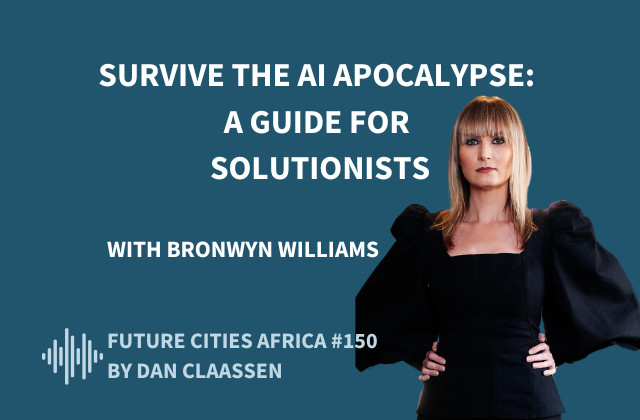Listen to Audio
South African Cities Network on Urban Safety, Wellbeing and Inclusion
Siphelele Ngobese is a Researcher in the Inclusive Cities Programme at SA Cities Network (SACN) and is responsible for the Urban Safety Programme. We explore the Urban Safety Programme and its objectives, accomplishments, and how they are inspiring action. We look at current urban projects incorporating inclusion, wellbeing, and safety. Finally, we consider the challenges of stakeholder collaboration and Siphelele’s hopes for cities in 2040.
Stay Connected
Key Takeaways
Introduction
- Siphelele explains her background and current role as an urban planner in the research field responsible for South African Cities Network (SACN) inclusion and wellbeing programme under which urban safety falls.
Urban Safety Programme: Objectives, accomplishments and inspiring action
- SACN has 8 largest metros as members. They collect intelligence, analyse and provide evidence around how cities can be better at what they do:
- In terms of productivity, inclusivity how well-governed they are, how they are financed and environmental sustainability.
- SACN facilitate learning and exchange between cities.
- Urban Safety Programme brings together public safety/ community safety/ urban safety practitioners.
- Define a sustainable approach that looks beyond law enforcement but engage with social, economic and spatial elements.
- Advocate cross-sectoral collaboration on the issue of safety.
- Siphelele explains the programme further.
- Annual State of Urban Safety in South Africa report since 2016.
- It is critical to have an evidence-based approach to crime and violence.
- Siphelele talks about more successes of their work, especially on the actual distribution of crime on a city level.
Urban projects incorporating inclusion, wellbeing and safety
- Urban safety is a human right.
- Public spaces have a social function.
- Public spaces: City of eThekwini and City of Johannesburg has been testing how to make parks and public spaces more vibrant and active places that communities feel ownership of and that meets their social function. Siphelele expands on these projects.
- SACN is developing a guide on Community Engagement.
- How you engage the community can make or break your project.
Challenges that stand in the way of collaboration
- Many interventions are driven in pockets/ in siloes.
- How some institutions are structured stand in the way of enabling the needed collaboration.
- Challenges on community and institutional levels are systemic.
- Siphelele goes through some practical examples.
- Public health is a critical component when thinking about safer cities.
Siphelele’s hopes for cities in 2040
- Significant reduction in crime and violence.
- Increased human wellbeing in our cities.
- Shifted from a profit-driven way of looking at cities.
- Covid-19 is an opportunity to rethink how we ’include’.
- Undone spatial inequality.
- Inclusive spaces and economies.
- Depending on the choices we make today we can equally regress and the situation becomes worse.
About Siphelele Ngobese
Siphelele Ngobese is a Researcher in the Inclusive Cities Programme at SA Cities Network (SACN). Under this banner, she coordinates the SA Cities Urban Safety Reference Group (USRG); which through an extensive research agenda, produces the annual State of Urban Safety in South Africa reports. The reports highlight the urban character of crime and violence and are a focal point of the USRG’s advocacy for integrated approaches to safety promotion. That means all players have a role, e.g. planning, environmental design and social development practitioners working in collaboration with law enforcement. She also manages SACN’s research programme on the Spatial Determinants of Wellbeing. This is an exploration of the linkages between space and access to life chances in South African cities by tracking progress on the realisation of spatially and socially just cities. The third component to the Inclusive Cities Programme centres on Youth, seeking to elevate the voice and capacity of young urban residents to co-create and influence decision-making in their cities. Siphelele leads a dynamic programme of engagement, incorporating the annual Young Planners Essay Competition, film screenings and technical learning modules to build the capacity of ordinary urban youth to engage with and influence local government. Siphelele’s own research interest is informality, particularly its interface with “world-class” African cities. She engaged with the subject in her Masters' dissertation, components of which featured in SACN’s 2016 State of Cities Report.
Visit: www.sacities.net/our-team/
About The South African Cities Network (SACN)
The South African Cities Network (SACN) is an established network of South African cities and partners that encourages the exchange of information, experience and best practices on urban development and city management. Since 2002 the SACN’s objectives are to:
- Promote good governance and management in South African cities
- Analyse strategic challenges facing South African cities
- Collect, collate, analyse, assess, disseminate and apply the experience of large city government in a South African context
- Encourage shared learning partnerships among spheres of government in order to enhance good governance of South African cities.
Visit: www.sacities.net







